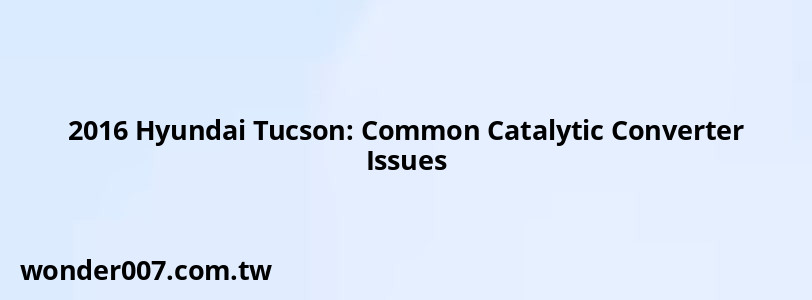2016 Hyundai Tucson: Common Catalytic Converter Issues

The 2016 Hyundai Tucson has been reported to have several catalytic converter problems, primarily concerning oil consumption and the converter's failure. This article will delve into the common issues, symptoms, causes, and potential solutions for Tucson owners experiencing these problems.
Common Symptoms of Catalytic Converter Problems
Owners of the 2016 Hyundai Tucson may notice several signs indicating a failing catalytic converter:
- Check Engine Light: A persistent or flashing check engine light can indicate that the catalytic converter is not functioning properly. This light often signals underlying issues within the exhaust system.
- Difficulty Starting: If you experience trouble starting your vehicle or notice rough idling, it may be due to a malfunctioning catalytic converter that cannot process exhaust gases effectively.
- Poor Performance: A clogged or damaged catalytic converter can lead to sluggish acceleration and reduced power. This is often accompanied by unusual noises from the exhaust system.
- Failed Emissions Test: If your vehicle fails an emissions test, it is a strong indicator that the catalytic converter is not performing its job of reducing harmful exhaust emissions.
Causes of Catalytic Converter Failure
Several factors contribute to catalytic converter problems in the 2016 Tucson:
- Oil Consumption Issues: Many Tucson owners report excessive oil consumption, which can lead to oil entering the exhaust system and damaging the catalytic converter. This is particularly problematic if the vehicle burns oil at a high rate, as it can coat the catalyst and impair its function.
- Clogging: The catalytic converter can become clogged due to debris or unburned fuel entering it, often resulting from engine misfires or other combustion issues. This clogging restricts exhaust flow and can lead to overheating.
- Neglected Maintenance: Regular maintenance is crucial for preventing catalytic converter failure. Ignoring oil changes or allowing the engine to run with low oil levels can exacerbate wear on the converter.
Replacement Costs and Options
The cost of replacing a catalytic converter in a 2016 Hyundai Tucson can be significant:
| Type | Cost Estimate |
|---|---|
| OEM Replacement | $2,260 - $2,827 |
| Aftermarket Options | $200 - $500 |
Many owners opt for aftermarket converters due to the high costs associated with OEM parts. While aftermarket options may be more affordable, it's essential to ensure they meet federal emissions standards to avoid future legal issues.
Solutions and Recommendations
To address catalytic converter issues in your 2016 Hyundai Tucson:
- Diagnose Early: If you notice any symptoms mentioned above, consult a qualified mechanic as soon as possible. Early diagnosis can prevent further damage and higher repair costs.
- Check for Recalls: Some models may be subject to recalls related to engine or exhaust system issues. Verify if your vehicle qualifies for any recall repairs that could cover costs associated with catalytic converter replacement.
- Maintain Regular Oil Changes: Ensure you adhere to a strict maintenance schedule for oil changes and monitor oil levels frequently. This practice helps mitigate potential damage to the catalytic converter from excessive oil consumption.
- Consider Aftermarket Parts: If replacement is necessary, explore reputable aftermarket options that provide good performance without breaking the bank.
By staying informed about these common issues and taking proactive measures, owners of the 2016 Hyundai Tucson can better manage their vehicle's health and performance.
Related Posts
-
Hyundai Elantra 2014 Headlight Bulb Replacement Guide
29-01-2025 • 215 views -
2009 Honda Accord: Troubleshooting Battery Light Issues
27-01-2025 • 205 views -
Hyundai Sonata Won't Start: Troubleshooting Brake Pedal Issues
27-01-2025 • 242 views -
2022 Hyundai Sonata N Line Night Edition: Available Now!
30-01-2025 • 248 views -
Chevy Traverse: Troubleshooting No Start Issues
29-01-2025 • 206 views
Latest Posts
-
How To Turn Off Paddle Shifters Mercedes
01-02-2025 • 462 views -
Rear Brake Caliper Piston Won't Compress
01-02-2025 • 425 views -
Are O2 Sensors Covered Under Warranty
01-02-2025 • 449 views -
2015 Chevy Traverse AC Recharge Port Location
01-02-2025 • 490 views -
Power Steering Fluid Leak On Passenger Side
01-02-2025 • 536 views
Popular Posts
-
V12 Engine Costs: What You Need to Know
26-01-2025 • 776 views -
Toyota Hiace: Fuel Efficiency Insights for 2025
26-01-2025 • 803 views -
Hino Warning Lights: Understanding Dashboard Alerts
26-01-2025 • 956 views -
EPC Light: Understanding Causes and Solutions
26-01-2025 • 1153 views -
BMW X5: Fuel Tank Capacity and Specifications
28-01-2025 • 725 views
